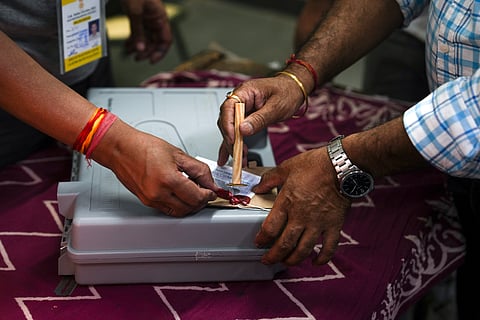

Delhi has voted. Data says Delhi has not voted as aggressively as in 2014 or even 2019. The question is, has Delhi voted differently from the previous polls just in numbers or in spirit too. One should try and find an answer.
It’s often been said that Delhi is the barometer of the national mood specially as reflected in the results of the Lok Sabha polls. Delhi has always voted overwhelmingly for the party which has formed government at the Centre. This trend has been there since 1971, when the Congress won seven but in 1977 Janata Party (fighting under the name and symbol of Bharatiya Lok Dal) wresting all seven reflecting the national mood.
In 1980 the trumpet for the return of the Congress to power was firmly sounded in Delhi too, with the party winning six of the seven seats. The only exception was Atal Bihari Vajpayee then fighting under the Janata Party symbol.
The 1984 polls were fought in the shadow of the assassination of Prime Minister Indira Gandhi and the subsequent sympathy wave in the favour of the Congress. Replicating its 400-plus performance nationally, the Congress won all the seven seats in the national Capital.
The turmoil of the 1990s, with the making and breaking of the alliances in post-Mandal politics, was also reflected in the results of Delhi. In 1989 following the Bofors controversy, Congress could retain just two whereas the BJP made a strong foray winning four with one going to its alliance partner Janata Dal.
In 1991, Congress managed to win two and BJP five. However, Congress added another seat when Lal Krishna Advani decided to vacate his New Delhi seat and film star Rajesh Khanna won the seat in the bypoll in 1992. The political turmoil again reflected in the 1996 polls with the BJP winning five and Congress just two.
The consolidation of the BJP in the national politics started to reflect in the results of Delhi with the party winning six seats in the 1998 polls. It went to better its performance in the 1999 midterm polls winning all the seven seats.
However, the undercurrent against the Atal Bihari Vajpayee-led NDA government got reflected in 2004 results with the BJP losing all the seven seats but one where party veteran Vijay Kumar Malhotra managed to scrap through by barely 13,000 votes.
In 2009, with the Congress on an upswing and Sikh community, courtesy the Prime Minister Manmohan Singh, voting for the party after a long while, won all the seven seats with a thumping majority. Similarly, 2014 and 2019 polls results with BJP winning all the seven seats on both the occasions was prototype of the performance of the BJP nationally under the leadership of Prime Minister Narendra Modi.
Another distinct feature of the 2014 and 2019 polls in the national capital were that they triangular with all the three parties – BJP, Congress and the Aam Aadmi Party fighting equally strongly on all the seven seats. This in 2014 allowed a smooth sail for BJP and in 2019 a sweep for it with huge margins some being as large as 5.5 lakh.
However, the Congress victories in 2009 and 2004 had been preceded by the huge victories registered by the party in 2003 and 2008 Vidhan Sabha (state assembly) polls. Sheila Dikshit’s tenure as Chief Minister and the Congress’s focus on development and infrastructure projects in Delhi greatly helped the party secure victories in the 2004 and 2009 Lok Sabha polls.
The BJP, however, has been deprived of similar luck that despite handsomely winning the 2014 and 2019 Lok Sabha polls in the national Capital, it has been routed in the assembly polls of 2015 and 2020. Conversely, the Aam Aadmi Party despite spectacular performance in 2013, 2015 and 2020 assembly polls has so far failed to win even a single seat of the Lok Sabha from the national Capital.
Will 2024 be different, will it reflect a landslide victory or a turmoil in politics. The first decade of the 21st century had seen a similar bipolar electoral landscape with the Congress and BJP as the primary contenders. During this period increasing urbanization, issues such as public safety and infrastructure development played pivotal role in shaping voter preferences.
Though this time too it’s bipolar - BJP versus the INDI alliance, the complex of campaign is very different. The 2024 campaign was cantankerous focusing mostly on mudslinging. It was a campaign where the issues pertaining to Delhi were all lost in the bitter cacophony. Delhi has voted, some would win, but its issues will continue to remain unaddressed.
Sidharth Mishra
Author and president, Centre for Reforms, Development & Justice